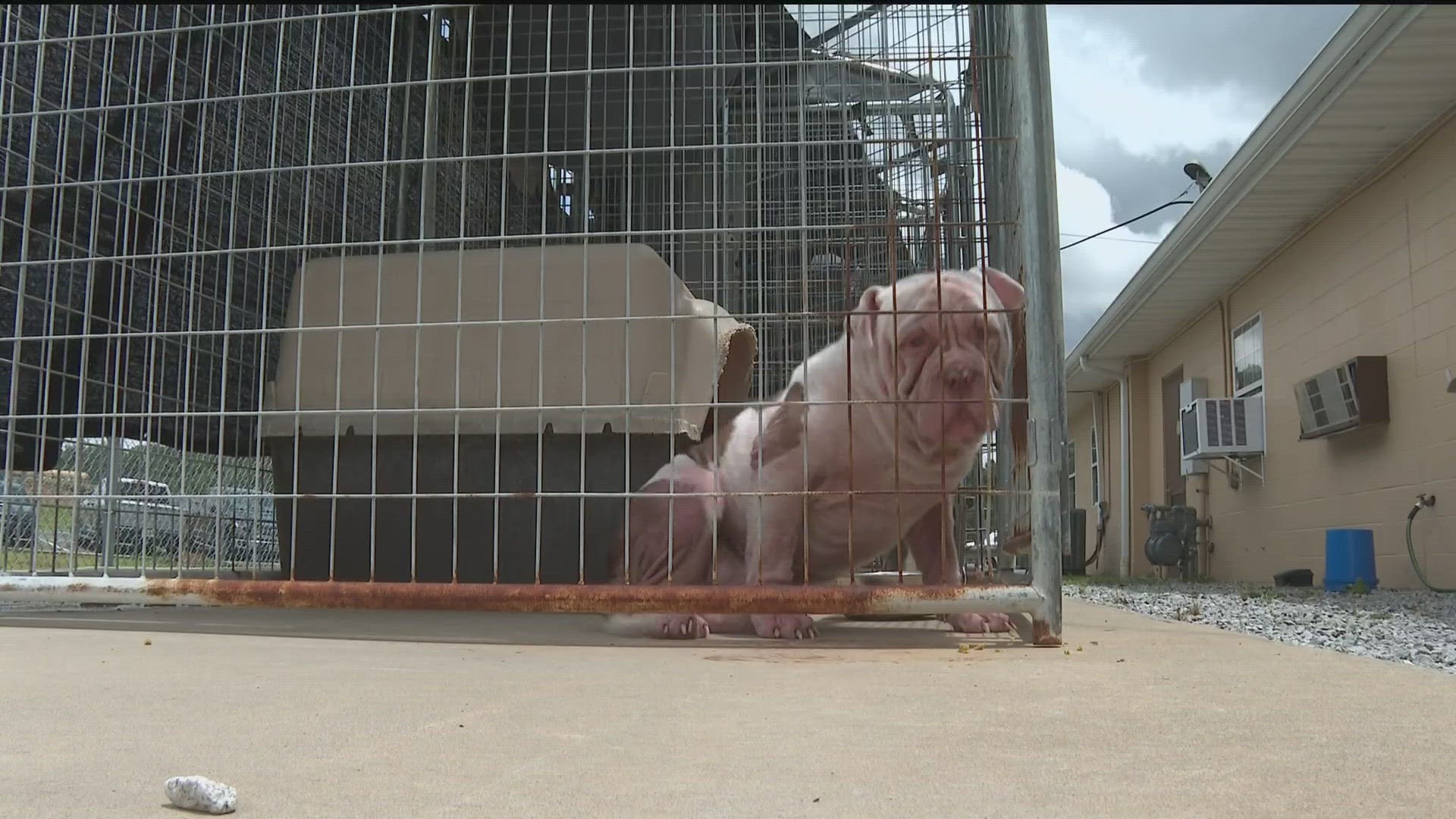JONESBORO, Ga. — Many animal shelters across metro Atlanta are over capacity and having to make tough decisions on which animals to euthanize. Some shelters said a big part of that increase is due to animal hoarding.
More than 250,000 animals are victims of hoarding each year in the United States; almost 40% of object hoarders also hoard animals, and 80% of hoarders have dying or dead animals in their homes, according to the Anxiety and Depression Association of America.
Dozens of dogs remain within the confines of Clayton County Animal Control, and Captain Jodi Turnipseed said she's almost never seen overcrowding this bad.
“We have the house dogs outside. We don't have space inside," Turnipseed said. “This is a couple of our outside pens. You see, we have tarps over them. We are overcapacity inside, so right now we wound up having to keep dogs outside just to be able to accommodate the numbers coming in on a daily basis."
Some reason for the high number of dogs at animal control includes evictions from the COVID-19 pandemic, people abandoning dogs and animal hoarding cases.
“We pulled 18 dogs and a rabbit from the hoarding case in Lake City," Turnipseed said.
Many of the dogs are missing most of their hair from dermatitis.
“They were definitely covered in fleas," Turnipseed said.
Turnipseed said the animals lived in deplorable conditions inside the confines of a home, and officers saw the owner throwing dogs out of a window when they arrived.
“We had neighbors calling in and complaining about the odor that they actually thought that something was dead in the home," Turnipseed said.
This all started with just two dogs and quickly got out of control with two litters of puppies.
“I don't know if it was from the father or from one of her puppies, and she ultimately had another litter," Turnipseed said.
The dogs from this hoarding case have been at animal control for a month and have taken up 18 kennels during that time.
“Right now, we don't have an option, and we have had to euthanize for space just to accommodate the hoarding case," Turnipseed said. "In hoarding cases, we have to maintain those animals as evidence until trial.”
Atlanta psychologist Dr. Becky Beaton-York appeared in 60 episodes of TLC's show "Hoarding: Buried Alive."
“There are typically two reasons why people will hoard, and the first one has to do with an overwhelmed rescuer," Beaton-York said.
The second reason why people may hoard animals is to have control over something.
“They might have what we call a personality disorder of some kind, a characterological disorder, and that could often be antisocial personality disorder," Beaton-York said.
Beaton-York said most animal hoarders have some kind of mental illness, such as depression.
"Those people might hoard animals because they're just so depressed that they can't get the animals to get the care that they need or go finish what they planned on doing, like fostering the animals," Beaton-York said. "Maybe they rescue, and they foster, and then they're supposed to find homes for them or find other foster parents for those animals and then they don't follow through."
Anxiety is also commonly associated with animal hoarding.
"Maybe they're socially anxious and then the animals become their social life. In fact, that's also another reason why people will hoard animals because animals love us, and they make us feel wanted and appreciated," Beaton-York said.
Beaton-York said obsessive-compulsive disorder and attention-deficit/hyperactivity disorder are also seen in those who hoard animals.
Hoarding became a recognized disorder in 2013. One of the symptoms is an obsession with collecting items of any kind.
“Then the people have a difficult time letting go of them to the point of it, causing some kind of functional impairment in their living environment," Beaton-York said.
The problem isn't just in Clayton County. 11Alive has previously covered animal hoarding cases in LaGrange, as well as Habersham, Douglas, Gwinnett, Cherokee, Forsyth, Fulton, Henry, and DeKalb Counties.
“I believe that animal hoarding is increasing because of COVID. I think a lot of folks started acquiring animals," Beaton-York said.
That's something Turnipseed agrees with, and it's leading more animals like the pups from the Lake City hoarding case to spend their days within the confines of a kennel.
“Some of it is a savior complex. It's trying to do the best thing for the animals, but not necessarily being in the best environment in the conditions that they're in," Turnipseed said.
Hoarding disorder can stem from trauma and is typically hereditary, Beaton-York said.
"Is it really a neurological disorder. If you find yourself having a hard time having compassion toward them, realize that their brain is just wired differently than the average person," Beaton-York said. "Also, what happens is they usually have some propensity toward hoarding at a young age, and then maybe there might be parents or other people keeping it in check."
Medication helps about 30% of people with hoarding disorder, so the real improvement comes in learning new coping mechanisms.
"Each time they are going upstairs or downstairs, take something with them that needs to go to those places, help them realize it," Beaton-York said. "Places need a home, and they need to have a place to live in a house. The blender lives in the cabinet, and the magazines live in the rack of them, and it's helping them start to learn new skills.
More than 70% of those diagnosed with hoarding disorder are women ages 50 to 59. About 50% of hoarders live alone, which can make it easier for them to hide the condition of a home or animals.

